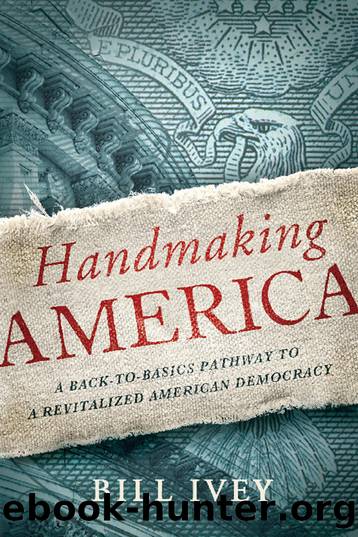Handmaking America by Bill Ivey

Author:Bill Ivey
Language: eng
Format: epub
ISBN: 9781619021242
Publisher: Catapult
Published: 2018-05-16T00:00:00+00:00
I know some of this probably feels like reheated conventional wisdom. The trends that have taken America to our current dismal state have been with us in one way or another for the past one hundred years. And dozens of experts writing across many decades have decried the power of television, the impact of technology, and the manipulative sophistication of marketing. It is not their mere existence but the exaggerated power that media, technology, and advertising have acquired over the last three decades that have dismantled core values of Americaâs social democracy.
The ideology of consumerism did not overwhelm Americans through marketing alone. After all, TV does more than rent screen time to advertisers. Most of the time, television drama, game shows, and gossip-laden entertainment and celebrity news programs bombard audiences with endless representations of lives filled with wealth and glamour. At the same time that television advertising sells us commoditized products, services, and lifestyle opportunities, the programming stuffed between commercials offers a worldview that, though skewed, is close enough to reality to influence attitude and action.
Television exaggerates and dramatizes everyday life. It tilts toward the sensational and the immediate, and it has difficulty taking on complex, slow-to-evolve, gray-area issues of life, politics, and society. And because television is a commercial medium, the relative cost of different kinds of programming shapes what we see. Prime-time drama and global news coverage are expensive, but games, home improvement strategies, kitchen adventures, dangerous occupations, people in jail, and the lifestyles of wives, teens, and drinking buddies are cheap. Cost has encouraged cable televisionâs striking race to the bottom.
Television has played an extraordinary role in reshaping how Americans think, what Americans want, and how Americans perceive happiness, power, and quality of life. Again, this is not entirely new. Television has been viewed with cautionâsometimes with alarmâsince FCC chairman Newton Minow famously labeled it a âvast wasteland.â Historical criticism has focused on three interconnected observations: television is vapid; violent and sexually explicit content is a bad influence on behavior (especially of young people); and viewing embeds slothful passivity.
Each of these observations is true in its own way, but the modern era of television narrowcasting through cable and satellite transmission has greatly empowered the mediumâtraditional critiques of TV highlight the least of it. Further, telephones and Internet-enabled computing and reading devicesâearly on advanced as gateways to privacy, choice, and creative freedomâhave taken up and expanded on the basic character of old-time TV. They are engaged in selling us goods and services, but they also tell us stories. Much if not most of what we think about the world comes to us through moving images on screens. And it goes without saying that present-day screen media is qualitatively unlike that of the 1950s and 1960s; old-timey TV ads for aspirin or new cars have today been superseded by a ramped-up, sophisticated, multiplatform juggernaut of anxiety and envy that can be assuaged only by buying something. And, as Peter Whybrow points out, todayâs media is especially obtrusive, because âtechnology is now mobile and targets the person rather than a place.
Download
This site does not store any files on its server. We only index and link to content provided by other sites. Please contact the content providers to delete copyright contents if any and email us, we'll remove relevant links or contents immediately.
International Integration of the Brazilian Economy by Elias C. Grivoyannis(57394)
The Radium Girls by Kate Moore(10918)
Turbulence by E. J. Noyes(7059)
Nudge - Improving Decisions about Health, Wealth, and Happiness by Thaler Sunstein(6644)
The Black Swan by Nassim Nicholas Taleb(6205)
Pioneering Portfolio Management by David F. Swensen(5616)
Rich Dad Poor Dad by Robert T. Kiyosaki(5167)
Zero to One by Peter Thiel(4836)
Man-made Catastrophes and Risk Information Concealment by Dmitry Chernov & Didier Sornette(4749)
Secrecy World by Jake Bernstein(3790)
Millionaire: The Philanderer, Gambler, and Duelist Who Invented Modern Finance by Janet Gleeson(3576)
Skin in the Game by Nassim Nicholas Taleb(3480)
The Age of Surveillance Capitalism by Shoshana Zuboff(3432)
The Money Culture by Michael Lewis(3292)
Skin in the Game: Hidden Asymmetries in Daily Life by Nassim Nicholas Taleb(3273)
Bullshit Jobs by David Graeber(3190)
The Dhandho Investor by Mohnish Pabrai(3176)
The Wisdom of Finance by Mihir Desai(3087)
Blockchain Basics by Daniel Drescher(2896)
